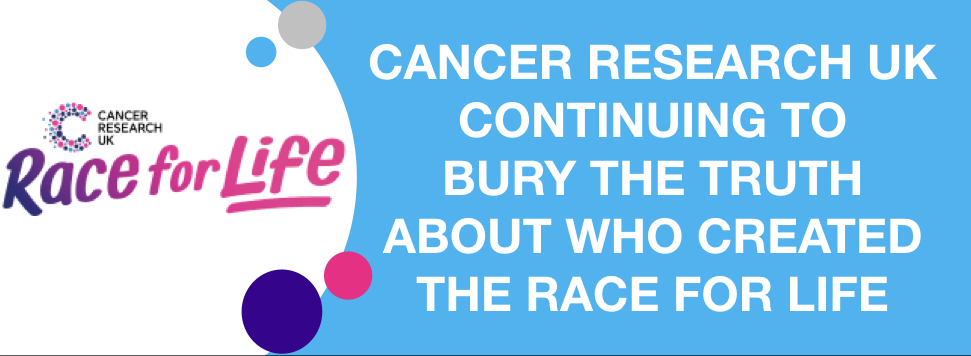
In March we reported how the new Chair at Cancer Research UK, Lord Simon Stevens, had snubbed Race for Life creator Jim Cowan by failing to reply to his letter of 18th October 2023.
Jim’s letter was in response to Stevens’ appointment as Chair at CRUK and asking that he assist in putting right a wrong of almost thirty years, that of Jim being written from the history of the Race for Life, the event he created.
Incredibly, Stevens has finally replied. Or, more accurately, Simon Ledsham (Cancer Research UK’s Director of Fundraising) has replied on his behalf.
Ledsham’s letter was dated 15th May 2024 meaning it took an incredible seven months for CRUK to reply to Jim Cowan’s letter. Yes, you read that correctly, seven months.
Why the reply took so long in coming is unclear. It certainly said nothing new, stating that CRUK do not credit anyone with originating any of their events.
It is a position riddled with flaws and which only evidences the fact that CRUK will use any excuse to avoid having to face up to the truth.
The line has been used by CRUK previously when their Head of Legal, Nicki Ford, replied to a 2017 letter from Jim to the former CRUK Chief Executive Harpal Kumar. Ford’s letter, referring specifically to the Race for Life, stated, “we do not publicly credit anyone with originating the event, whether it be a former employee or otherwise.”
Not crediting former employees for events they might have created may be reasonable. After all, it was part of their job. That said, some might consider it more than a little hypocritical given the recognition successive CEOs and Chairs have been happy to accept for simply doing their jobs.
However, that is irrelevant. Jim was never an employee of the organisation. He came up with the idea following his own father’s cancer diagnosis and proposed the event to the Imperial Cancer Research Fund (ICRF; CRUK’s former name) as one that he would organise and deliver, and which ICRF would benefit from.
He came up with the idea completely independently of ICRF/CRUK and never proposed the Race for Life would become anything other than an event that he would organise in support of them. He never proposed that the event should be taken over and run by them.
It was only after the successful launch of the event in 1994 that ICRF’s Head of Events, Jill MacRae, called Jim up and told him he was no longer required. Yes, they stole the event. And MacRae even went on to falsely claim she had created the event herself.
Surely, given this history, it would be right and proper for a charity, an organisation you would hope has at least some integrity, to put the record straight and recognise Jim (and, in so doing, his father’s memory).
Unfortunately, CRUK are not an organisation of integrity. Instead they prefer to keep the truth buried and continue to lie.
And the evidence exposes CRUK’s ‘credit no one’ stance for the cover up it is.
Previously they have cited a number of different, incorrect, sources as where the Race for Life originated. But they were happy to do so, happy to give credit, even though it was to the wrong people they were crediting. What of the ‘credit no one’ stance then?
They turned a blind eye to Jill MacRae’s lies (and fraud) when she claimed to have created the event; a lie which did nothing to harm MacRae’s career. There was no ‘credit no one stance’ then.
Cancer Research UK also regularly recognise those from outside their organisation (as Jim was) for their fundraising efforts, for the events and other fundraisers they stage. They even have an annual awards ceremony at which these individuals are recognised, the Flame of Hope Awards. Hardly ‘credit no one.’
Their social media regularly applauds the efforts of those both from within and from outside the organisation for their efforts to raise funds. ‘Credit no one’?
They happily accept recognition for themselves, presumably not seeing doing so for the hypocrisy it is. Stevens himself has accepted a peerage and a knighthood in recognition of his own work. CEO Michelle Mitchelle accepted an OBE in recognition of her work. Previous Chairs and CEOs have done the same.
But, when it comes to recognition for Jim Cowan for creating their largest and most successful fundraiser, it is a position of ‘credit no one.’ A dictionary definition of the word hypocrisy.
Why adopt a ‘credit no one’ stance when both their history and their present day are littered with examples of credit being given and achievements being recognised? This, on top of a history of citing incorrect sources for the event for which they now ‘credit no one’.
And then there was their 2020 inquiry into the origins of the Race for Life. A sham inquiry if ever their was one. An inquiry which chose not to speak to witnesses and failed to ask for any documentary evidence before coming up with the finding that the origins of the Race for Life could not be established. And why have that inquiry if the organisation’s position is one of ‘credit no one’ anyway?
And it was the same Simon Ledsham who has now written to Jim, on behalf of CRUK’s Chair, citing their sham ‘credit no one’ stance, who wrote at that time (2020) that they had; “explored all reasonable lines of enquiry” and had been “unable to find any solid evidence which supports his (Jim Cowan’s) claim to be the sole originator of Race for Life.”
Well, which is it Simon? Do you ‘credit no one’ or do you spend time investigating (without seeking evidence or witnesses) before stating you’ve been unable to find the evidence you never looked for?
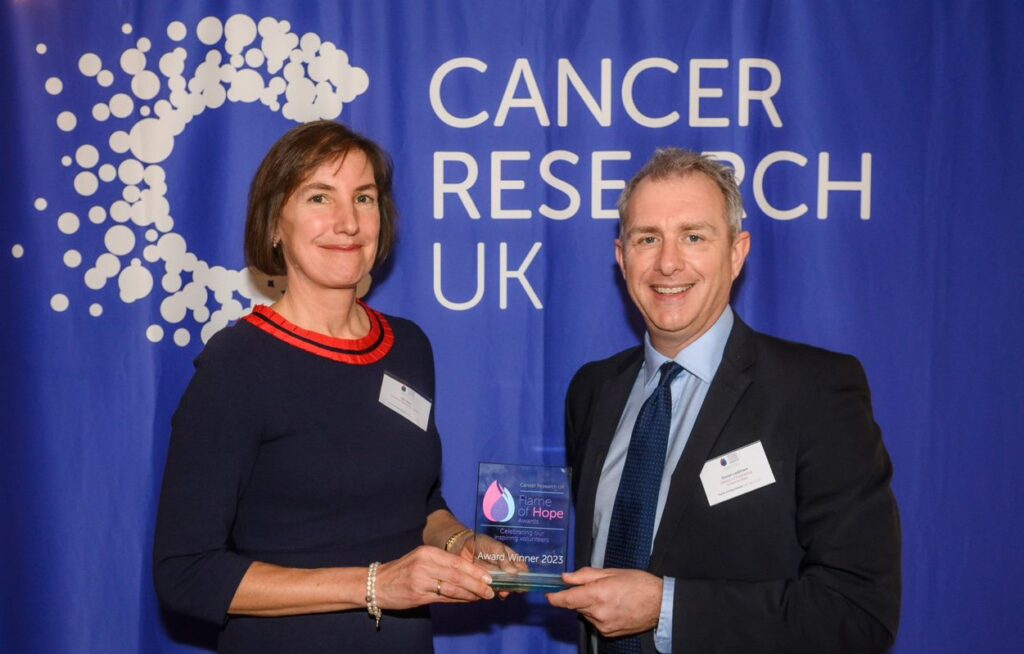
Indeed the evidence, should you bother to look for it, speaks for itself. The correspondence from 1993 (page 1 here here and page 2 here) and 1994 (here) is clear. If there is doubt, witnesses can be asked. If there is still doubt, even Runners World magazine acknowledge the Race for Life as Jim’s creation. And they should know because Jim involved them from the very start.
But CRUK choose to ignore all the evidence opting instead to keep the truth buried, to ignore the lies they have told over the last thirty years, to ‘credit no one’ while hypocritically crediting others and accepting credit for themselves.
Recent years have seen a number of cover ups exposed. From Grenfell to Hillsborough and from contaminated blood to the Post Office, among many others. Perhaps, in their denial, in their lies, and in their covering up of the truth, Cancer Research UK’s senior management are doing little other than attempting to create ‘plausible deniability’ over how much they know just in case media, politicians and the courts ask questions of them in the future?
But the dishonesty, the hypocrisy and the many contradictions are there and clear to see for all who care to look.
CRUK by name, crooks by nature.
In the Race 4 Truth, Cancer Research UK are lagging behind.

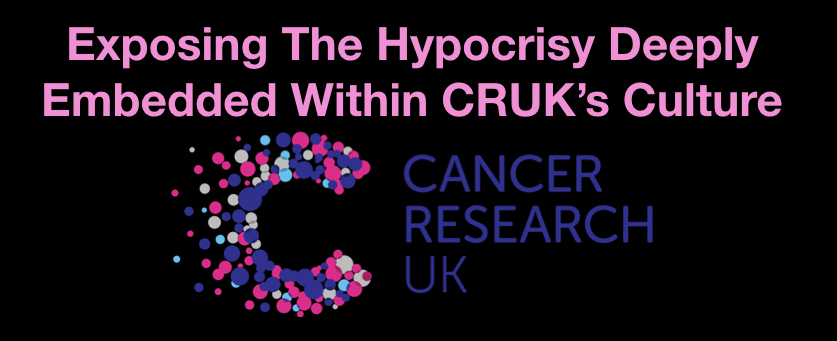
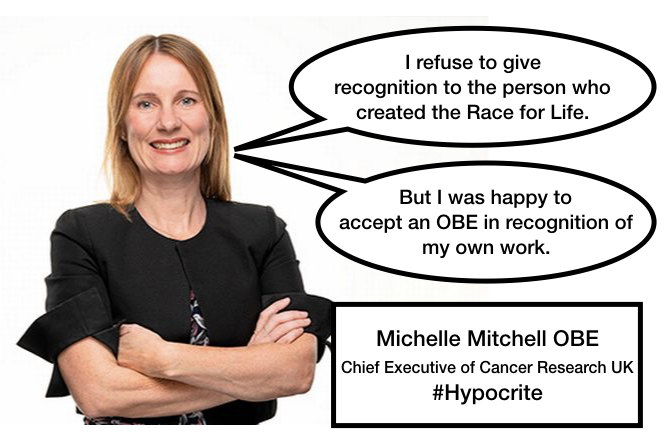
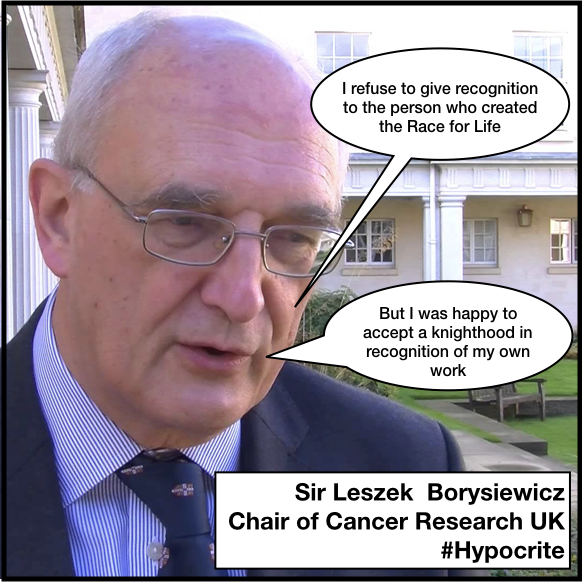

 During the summer, Cancer Research UK used a new strap line for its events; “Cancer Plays Dirty, So Do We” – a case of never a truer word spoken, demonstrated by their support for fraud, lies, hypocrisy and more over recent months.
During the summer, Cancer Research UK used a new strap line for its events; “Cancer Plays Dirty, So Do We” – a case of never a truer word spoken, demonstrated by their support for fraud, lies, hypocrisy and more over recent months.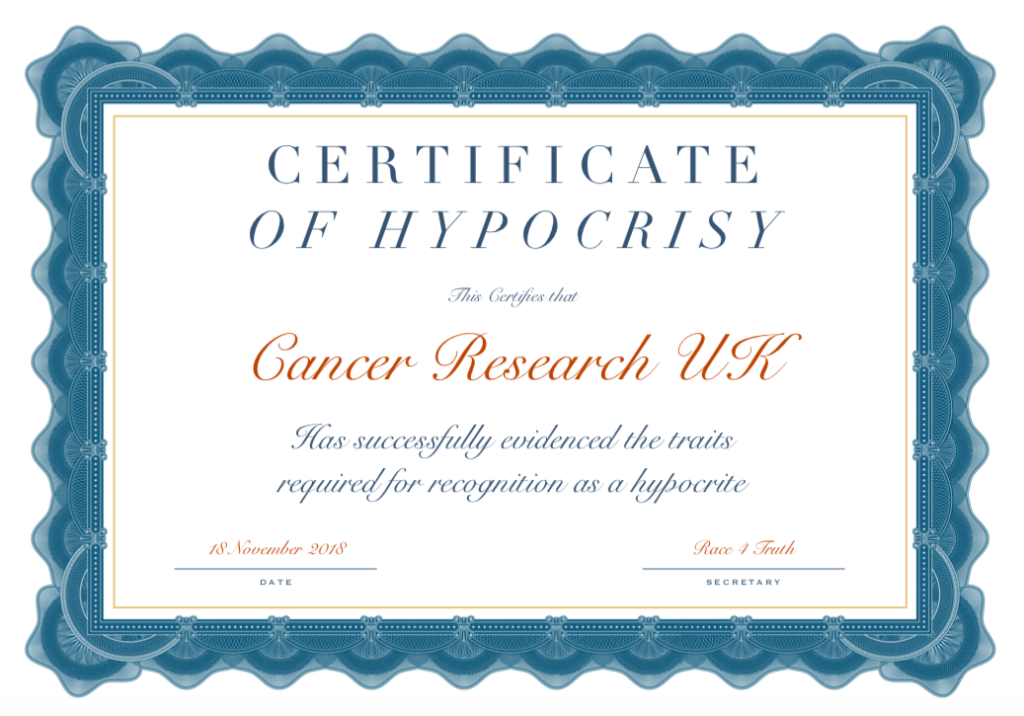 The Race 4 Truth was established in order to bring public attention to the way
The Race 4 Truth was established in order to bring public attention to the way 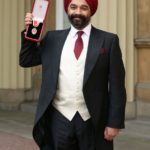 Their previous Chief Executive, Sir Harpal Kumar,
Their previous Chief Executive, Sir Harpal Kumar,  And what of their Chairman, Professor Sir Leszek Borysiewicz, who was knighted in 2001 in recognition of his work. Where does he stand on recognising Jim Cowan for the creation of an event his charity has gained so much through? He refuses to recognise Jim at all. No, it is fine for others to recognise him but not for him to recognise Jim. Hypocrisy?
And what of their Chairman, Professor Sir Leszek Borysiewicz, who was knighted in 2001 in recognition of his work. Where does he stand on recognising Jim Cowan for the creation of an event his charity has gained so much through? He refuses to recognise Jim at all. No, it is fine for others to recognise him but not for him to recognise Jim. Hypocrisy? When Cancer Research UK’s new Chief Executive, Michelle Mitchell, takes up her post later this summer, she will face many of the same challenges facing all CEO’s, whether in the corporate or charity sector. Where is the organisation going? How will it maintain or increase growth? What will the broader economy mean to fundraising? And more, including understanding and improving public perceptions of the charity.
When Cancer Research UK’s new Chief Executive, Michelle Mitchell, takes up her post later this summer, she will face many of the same challenges facing all CEO’s, whether in the corporate or charity sector. Where is the organisation going? How will it maintain or increase growth? What will the broader economy mean to fundraising? And more, including understanding and improving public perceptions of the charity.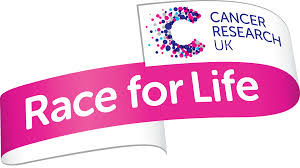
 The Race 4 Truth
The Race 4 Truth  They Tweeted using Father’s Day as a marketing tool and calling on people to honour fathers affected by cancer while (still) ignoring Jim Cowan and denying him recognition for creating the event and in full knowledge of the fact that the inspiration behind Jim’s creating of the Race for Life was his own father’s cancer diagnosis in 1993. Hypocrisy?
They Tweeted using Father’s Day as a marketing tool and calling on people to honour fathers affected by cancer while (still) ignoring Jim Cowan and denying him recognition for creating the event and in full knowledge of the fact that the inspiration behind Jim’s creating of the Race for Life was his own father’s cancer diagnosis in 1993. Hypocrisy? C
C The charity’s new Chief Executive Officer will be starting work soon. Michelle Mitchell already has an OBE so we know she is willing to accept recognition for her achievements. We can only hope that, unlike those who preceded her, she is not a hypocrite and will be keen to ensure recognition to all who merit it both within the organisation and without.
The charity’s new Chief Executive Officer will be starting work soon. Michelle Mitchell already has an OBE so we know she is willing to accept recognition for her achievements. We can only hope that, unlike those who preceded her, she is not a hypocrite and will be keen to ensure recognition to all who merit it both within the organisation and without.